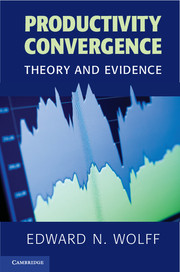Book contents
- Frontmatter
- Contents
- Acknowledgments
- 1 Introduction
- 2 An Overview of Modern Growth Theory
- 3 The Measurement and Estimation of Productivity Growth
- 4 Long-Term Record among the Advanced Industrial Countries
- 5 Postwar Record on Productivity Performance on the Aggregate Level among the Advanced Industrial Countries
- 6 Further Details on the Role of Education and Technology in the Productivity Performance among the Advanced Industrial Countries
- 7 Productivity Performance on the Industry Level among the Advanced Industrial Countries
- 8 The Productivity Slowdown
- 9 Postwar Economic Performance among Countries of the World
- 10 Recapitulation and Future Prospects for Growth
- Bibliography
- Index
9 - Postwar Economic Performance among Countries of the World
Published online by Cambridge University Press: 05 June 2014
- Frontmatter
- Contents
- Acknowledgments
- 1 Introduction
- 2 An Overview of Modern Growth Theory
- 3 The Measurement and Estimation of Productivity Growth
- 4 Long-Term Record among the Advanced Industrial Countries
- 5 Postwar Record on Productivity Performance on the Aggregate Level among the Advanced Industrial Countries
- 6 Further Details on the Role of Education and Technology in the Productivity Performance among the Advanced Industrial Countries
- 7 Productivity Performance on the Industry Level among the Advanced Industrial Countries
- 8 The Productivity Slowdown
- 9 Postwar Economic Performance among Countries of the World
- 10 Recapitulation and Future Prospects for Growth
- Bibliography
- Index
Summary
Introduction
The term “aggregate convergence” refers to the gradual diminution of differences in productivity levels for the overall economy of countries over time. Previous explanations of the productivity catch-up almost all involve the advantages of backwardness or Gerschenkron effect, by which it is meant that much of the catch-up can be explained by the diffusion of technical knowledge from the leading economies to the more backward ones (see Gerschenkron, 1952, and Kuznets, 1973, for example). From this view, technological progress operates through a mechanism that enables countries whose level of productivity is behind (but not too far behind) that of the leading country(ies) to catch up. Through the constant transfer of knowledge, countries learn about the latest technology from each another, but virtually by definition the followers have more to learn from the leaders than the leaders have to learn from the laggards. On the other hand, those countries that are so far behind the leaders that it is impractical for them to profit substantially from the leaders’ knowledge will generally not be able to participate in the convergence process at all, and many such economies will find themselves falling even further behind.
The most important influence underlying this process is the transfer of technology that occurs constantly among many of the world’s economies. There is strong evidence that advanced industrial countries continuously acquire technical ideas from each other. Competitive pressures in the international economy ensure rapid dissemination of superior productive techniques from one country to another. However, in the process of reciprocal exchange of ideas, clearly it is the more backward countries that have more to learn from the leaders than the reverse. That is the heart of the explanation of a convergence process.
- Type
- Chapter
- Information
- Productivity ConvergenceTheory and Evidence, pp. 341 - 429Publisher: Cambridge University PressPrint publication year: 2013



